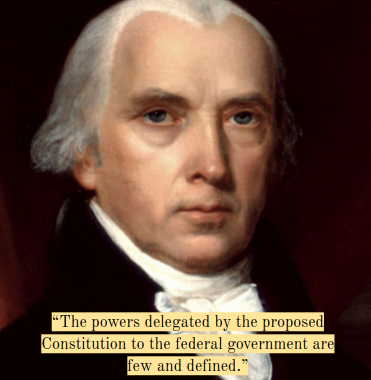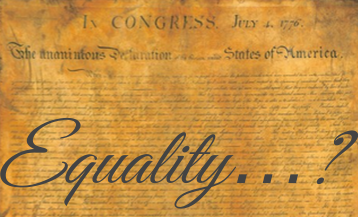Define: Progressive
Welcome to 2016. Where America seems to have no problem with the fact that 50% of the Iowa Democrat Caucus vote went to a self-avowed socialist. How far we have come.
If you’ve read this blog at all, you may be tired of hearing me revert back to the Constitutionally required oath of office that the new president will take come January, 2017.
"I do solemnly swear (or affirm) that I will faithfully execute the Office of President of the United States, and will to the best of my ability, preserve, protect and defend the Constitution of the United States."
This primary season and the subsequent general election are meant to be a job interview where we decide who is most qualified to do the job of President. And what is that job? “Preserve, protect and defend the Constitution of the United States.” This is an unarguable fact. Presidents are not meant to be social reform warriors, fighters for the “middle class”, or any other campaign slogan being thrown around. A president’s job is to first, preserve the Constitution, second, protect the Constitution and third, defend the Constitution.
Last night, there was a Democrat debate on MSNBC. O’Malley’s out (if he was ever in), and now it’s down to Sanders vs. Clinton. Two people arguing about which is more “progressive”, Sanders proud of his socialist views, Clinton less so.
But let’s back up here and define our terms.
Progressive: a person advocating or implementing social reform or new, liberal ideas of civil liberty and equality with support for social justice and a mixed economy.
Socialist: a person who advocates or practices a political and economic theory of social organization that advocates that the means of production, distribution, and exchange should be owned or regulated by the community as a whole.
Communist: a person who supports or believes in a political theory derived from Karl Marx, advocating class war and leading to a society in which all property is publicly owned and each person works and is paid according to their abilities and needs.
(Whoah! How’d that last term get in there? Oh yeah, almost forgot, “Socialism is (in Marxist theory) a transitional social state between the overthrow of capitalism and the realization of communism.” But that’s beside the point. Kind of.)
Back on topic, sometimes definitions can be a bit wordy so let’s make this easy. A progressive in 21st century America is someone who wants to move on (“progress”) on from where society is to where they think it should be based on their liberal ideology. A socialist believes that everyone is better off when the government either minutely regulates or is in direct control of the economy and parts of society.
The liberal ideology involved in both Sanders socialism and Clinton’s progressivism includes (but is not limited to) government’s involvement and funding of education, welfare, and healthcare, the “right” to an abortion, the “right” to marry, immigration reform (amnesty), etc.
Both progressivism and socialism stand in stark contrast to conservatism. However, the two do not stand in contrast to each other.
From the debate, we saw again how Clinton and Sanders are most playing a game of semantics, arguing over wording and degree, not arguing over policy itself. Both are in favor of government funded college, universal, government controlled and mandated healthcare, government mandated paid family leave, and government mandated pay equality. Their disagreement comes when pressed on how to accomplish these goals and how far they should be taken.
The question not being asked is how they justify these policies from the Constitution. Admittedly this is not a popular or influential line of questioning considering the fact many people wouldn’t know the Constitution if it hit them in the face.
The “equality and fairness, sticking it to those rich fat cats, propping up the middle class, raising wages and lowering taxes,” it all sounds so good. And we have strayed so far from the Constitution that people aren’t realizing that, technically speaking, many of the candidate’s proposals are against the law (Constitution=supreme law of the land). But it sounds good, it appeals to our humanity. I hate to break it to Sanders and Clinton, but we do not have a government ruled by our emotions. We have a government that is to be ruled by law. And the supreme law in this land is the Constitution.
The Constitution grants certain powers to the federal government. These powers are “enumerated”, meaning they are listed, spelled out. James Madison (nickname: Father of the Constitution) said,
The Tenth Amendment was designed to limit the power of the federal government by declaring,
“The powers not delegated to the United States by the Constitution, nor prohibited by it to the States, are reserved to the States respectively, or to the people.”
In the Democratic primary race, you have two people whose express goal is to expand government, its reach and power. This is utterly and completely in violation of the Constitution.
Nowhere in the Constitution is the government given the right or responsibility to be involved in the healthcare of its citizens. And sorry, Senator Sanders, but healthcare is not a right. Neither is free public college. And government paying for college isn’t in our governing document either. And I haven’t even mentioned global warming.
In the job interview for president you must look at two things: (1) What is the president’s job? And (2) Is this person going to perform that job?
As we’ve seen, the job is to preserve, protect and defend the Constitution of the United States. We’ve also seen that someone who holds to progressive, socialist or communist beliefs is not capable of fulfilling the duty required of the president.
It’s just that simple.
Jonathan Paine




Comments
Post a Comment